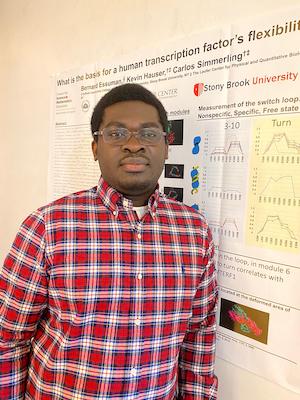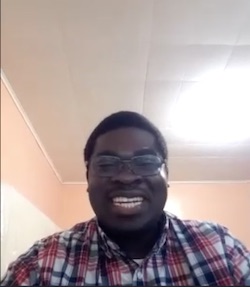Researcher of the Month
June 2020
 Bernard Essuman
Bernard Essuman
Biochemistry, Applied Mathematics & Statistics majors, Class of 2021
Research Mentor: Dr. Yuefan Deng, Applied Mathematics & Statistics; Dr. Miriam Rafailovich, Materials Science & Chemical Engineering; Dr. Carlos Simmerling, Chemistry
From his studies at Suffolk County Community College in Computer Science and Chemistry, to his current Stony Brook University experiences as a Biochemistry and Applied Mathematics double major involved in multiple undergraduate research projects with three different faculty research mentors, Bernard Essuman has been intensely focused on learning, gaining experience and training to solve problems.
Bernard is currently working on analyzing the binding intensity of COVID-19 to various surfaces to help understand how COVID-19 interacts with 3D printed face shields, cotton, skin, and hair. This project began with modelling a Fibrinogen-PLA (sheet) complex and performing simulations on the SeaWulf computational cluster, and is being conducted in collaboration with Dr. Yuefan Deng (Applied Mathematics & Statistics) and Dr. Miriam Rafailovich (Materials Science & Chemical Engineering). Bernard has also worked on several computational and structural biology projects, including another current project under the mentorship of Dr. Carlos Simmerling (Chemistry, Laufer Center for Computational Biology) on dihedral stability tests to analyze how well force fields predict protein structures. For Bernard, these cumulative experiences have really been productive and transformational: “ now I'm able to combine those two fields to do some advanced research. So basically, I think with research… the more you do, the more experience you get; and the more insights that you get to help solve real life problems. And that is what I really enjoy most about research!”
Bernard’s first experience in research came about through participating in the 2014 NIH-funded BIO-PREP program (administered by i-STEM) where he was placed in the Simmerling lab, and worked closely with then PhD student Kevin Houser on the “MTERF1-DNA binding and recognition mechanism.” While developing his skills in computational structural biology in the Simmerling lab, Bernard’s contributions to a project were recognized by being named second-author on “A Human Transcription Factor in Search Mode” (Nucleic Acids Research, Dec. 2015.). During 2015, Bernard began experimenting with 3D-printing and learning new skills as an REU mentor for high school students in the Garcia Center for Polymers at Engineering Interfaces directed by Prof. Rafailovich. In preparation for starting the Fibrinogen-PLA project with Professors Deng and Rafailovich, Bernard took graduate level coursework in Principles of Parallel Computing to enhance his skills.
Bernard’s long-term goal is to pursue an MD/PhD. Prior to moving to the US from Ghana in 2011, Bernard had completed two years of pharmacology studies at Kwame Nkrumah University of Science and Technology. In his spare time, Bernard enjoys watching movies, especially Marvel and DC Comics productions. Below are excerpts from his interview with Karen Kernan, URECA Director.
The Interview:
Karen. Thanks for joining me today via zoom. Could you tell me about the current project that you're working on?
Bernard: I am delighted to tell you more about my research. At the moment, I am analyzing the binding intensity of the COVID-19 to various surfaces. The study is important; it will help us to understand how COVID-19 interacts with 3D printed face shields, cotton, skin, and hair. We might be able to predict how long COVID-19 sticks to surfaces, and develop means of combating it. For the past three months, I have been working on Fibrinogen-PLA (sheet) interactions. Now, I am applying those techniques to model COVID-19 (protein)-Surface interactions.
How did you get first involved in this project?
Let me backtrack a little bit. About two semesters ago, Prof. Rafailovich told me she had an assignment for me, and that was to research on how Fibrinogen interacts with a PLA surface. For me to model it, I had to use a supercomputer (the SeaWulf computational cluster), and I also needed to develop my skills set. So I took a master's level class with Professor Yuefan Deng on parallel computing. And then I started doing research working with both Professor Rafailovich and Professor Deng, and we were able to come up with techniques for modeling it. Those same techniques were then available for the current research, which applies the models we developed to COVID 19 on surfaces.
And how is the research going? What is the next step for you with your current project?
The next step is actually doing machine learning with the surfaces. I have some data with the previous research I did on fibrinogen-PLA interaction. So I can use machine learning to then predict how the protein might interact with different surfaces, and then apply that to how other viruses, especially COVID 19, might interact with surfaces. That’s what I'm working with now.
When did you first meet Professor Rafailovich, one of your mentors? Was that through a class?
When I was still a student at Suffolk Community College, I joined the Garcia program as a mentor for high school students. I worked on 3D printing with one of her PhD students,Andrew Michaelson.
And was that your first research experience at Stony Brook?
So actually, my first real hands-on research experience occurred when I applied and
was admitted to the BioPREP program at Stony Brook in the summer 2014. That was when
I was still a Suffolk Community College student. Through BioPREP, we were assigned
to different mentors, and I was assigned to Prof. Simmerling’s lab.
That was my first time doing computational or structural biology research. And I think the research was quite intricate. I worked with Professor Carlos Simmerling, and PhD student Kevin Hauser, and what we worked on specifically was how MTERF1proteins (human mitochondria transcription factor) interact with DNA. I enjoyed the project and worked hard on it. Later on there was a publication, and Kevin Hauser who was first author made me a second author on the paper.
Fantastic!
So that was my first research experience. Since transferring to Stony Brook, I’ve been able to volunteer for a few other projects in Professor Simmering’s lab—and am currently working on dihedral stability tests to to analyze how certain force fields/water models predict protein structure.
At this point, you’ve had the opportunity to participate in several different projects—and research has been a constant in your undergraduate experiences. So what has kept you involved? What do you enjoy most about doing research?
What I enjoy most about doing research is the fact that I'm able to solve real life problems. When I joined Professor Carlos Simmerling’s lab, I was able to gather some skills in the computational structural biology field and eventually when I also volunteered in a Garcia program and worked with Professor Rafailvoich, I was able to learn other skills from materials research. And now I'm able to combine those two fields to do some advanced research. So basically, I think with research, the more you do, the more experience you get; and the more insights that you get to help solve real life problems. And that is what I really enjoy most about research.
What kind of mindset, would you say, do you need to succeed in doing research? What helps you to meet the challenges of doing research?
I think the mindset is: “Never give up.” And hard work. That is what has been pushing me through. When I started on Professor Simmerling’s lab. I was very new to computation. I had no idea about coding. And in fact, I didn't know what to do. But he gave me a couple of tutorials to study before I actually joined the lab. And I persevered. I remember some others decided not to go further because they thought they couldn't do it. But for me, through perseverance, hard work, never giving up and asking many questions, I was able to push through and get the job done.
Has mentorship been an important factor in helping you accomplish your goals?
I'll put it this way: mentorship is such a humbling thing. Each and every person that has mentored me has given me insight and direction of thought. I can remember a time in each project where my thinking about a particular subject area was maybe at a low level, or potentially ready to go off-track. But a mentor will give you a different direction to think from. And then it will open new ideas for me, a new door to explore. That is what mentorship provides. Through mentorship. I was guided, and helped to not to waste time if I was going off on the wrong path. I was able to resolve these things more easily because of mentorship.
What advice do you have for other undergraduates about research?
My advice is that research is important and it is worth trying… Some people may believe that they don't have the skill set, but I feel like they should just try. I feel that research is important because it's a way for you to make a contribution to humanity. There are so many questions out there. We all have to come together and help to solve these questions, whether it’s with cancer…or HIV AIDS…There are so many things to be solved.
Through my experiences, and through classes that I took, I’ve learned a lot and I have been able to come up with the right skill set to do what I do at the moment. Some skills I learned through classes that I took. Other things I’ve learned through my mentors who were able to direct me to books or YouTube videos that taught me other things…In Prof Carlos Simmerling’s lab, for example, he has a set of tutorials on many mini projects that he gives you that tie into the big project. So by going through the process of completing smaller steps, you are able to gather the necessary skills to handle a bigger project. It is through all these various research experiences that I have had that I was able to gain enough knowledge to do what I’m doing right now.
Well, it sounds like you've had good experiences at Stony Brook, and that research has played a big part in your education.
Yes, I’ve had very wonderful experiences and I really love it. If I had to do it again, I would do it all again!

